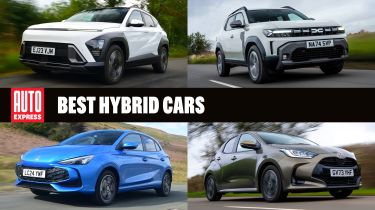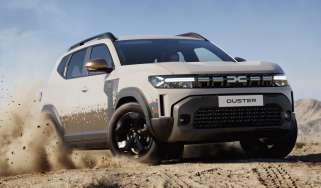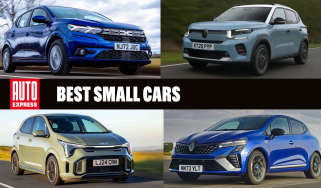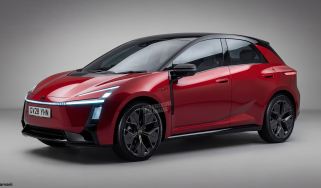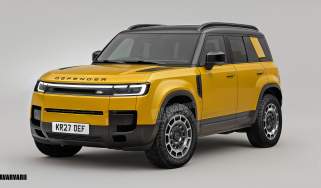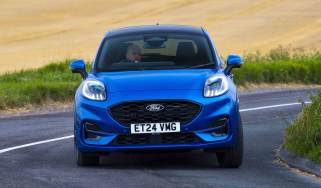Best hybrid cars to buy 2026
With more hybrid cars on the market than ever before, these are the best ones to buy
As car makers race to cut emissions, hybrid cars are gaining ground as the go-to choice for drivers who aren't ready to switch to a fully-electric car.
The best hybrid cars currently on sale offer better fuel efficiency than regular petrol or diesel cars by combining the traditional combustion engine with a battery and one or more electric motors.
These hybrid cars are capable of running exclusively on electric power at low speeds, such as in heavy traffic or around town. The engine will only kick in when it’s necessary as speeds increase. This can result in some big savings when it comes to emissions and fuel economy with no need to charge the car. You’ll sometimes see full hybrids referred to as ‘self-charging hybrids’.
If you’re looking for even more fuel savings, plug-in hybrid cars can travel further still on electric power, up to 50 miles or more in some cases. The larger batteries in these cars need to be regularly recharged via a plug, however, and when the battery is flat its extra weight can reduce efficiency.
In order to make your search as easy as possible, our experts have thoroughly tested every hybrid car that you can buy in the UK in order to decide on the very best.
Top 10 best hybrid cars
1. MG3 Hybrid+
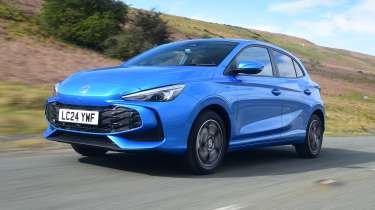
- Prices from £18,995
- Best hybrid car overall
| Pros |
|
| Cons |
|
The supermini market is dwindling, but the MG3 is still creating shockwaves, given that it offers a full-hybrid powertrain capable of returning over 60mpg, a huge amount of on-board tech, decent build quality and a genuinely fun driving experience. The best news? All of this starts from less than £19,000.
The MG3 bagged the Affordable Hybrid Car of the Year prize for the second year in a row at our 2025 New Car Awards. It is a big seller for MG, a brand which is currently going from strength-to-strength.
The interior is smart and hides its budget roots well. The materials feel robust, and getting comfortable behind the wheel is easy for most people, unless you are on the tall side. There is 293 litres of boot space which is on par with rivals like the Toyota Yaris and Vauxhall Corsa.
The MG3’s 10.25-inch touchscreen infotainment system is responsive and easy to use, and Apple CarPlay and Android Auto are also thrown in. Music fans may be a little disappointed by the rather weak speakers.
“The MG3 is among the most fun to drive, comfortable and best-equipped cars in its class. It’s also easily the fastest while returning strong fuel consumption figures.” – Alex Ingram, chief reviewer, who road tested the MG3 in the UK.
2. Dacia Duster Hybrid
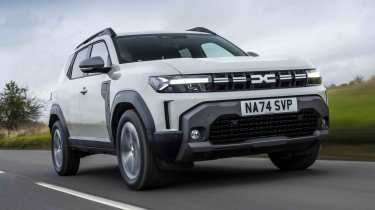
- Prices from £24,830
- Best for off-roading
| Pros |
|
| Cons |
|
The latest Dacia Duster is more desirable than ever, but it still retains its appealingly low starting price of around £25,000.
The Duster comes with a respectable amount of kit, despite being budget-friendly, especially if you opt for the Expression trim. This variant comes with a 10.1-inch touchscreen with wireless Apple CarPlay and Android Auto. Thanks to its cleverly designed interior, this tough, budget-friendly SUV is more than capable of taking on family car duties.
The hybrid-powered Duster is fitted with a 1.6-litre powertrain that’s sourced from parent company Renault and shared with the Dacia Jogger Hybrid, so it’s a tried-and-tested set-up. It shouldn’t be difficult to achieve an average fuel economy figure of over 50mpg.
“We’re pleased to report that the Duster hasn’t lost its way, because the third-generation SUV offers great-value motoring and family car practicality at an affordable price.” – Alex Ingram, chief reviewer, who drove the Dacia Duster in the UK.
Dacia Duster reviewDacia Duster deals
3. Toyota Yaris
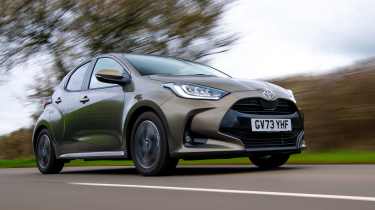
- Prices from £23,445
| Pros |
|
| Cons |
|
The basic template for the Toyota Yaris’s petrol/electric set-up is largely similar to that in the brand’s first production hybrid, the Prius: an Atkinson Cycle petrol engine (in this case a 1.5-litre unit) and electric motor both drive through what Toyota calls an ‘e-CVT’ gearbox (essentially a power-splitter that mixes and matches petrol and EV power), supplied by a small battery.
But constant honing of that formula has resulted in a superbly smooth, lively and efficient small car. Officially it’ll hit as much as 70.6mpg, and we achieved a figure very close to that during our testing.
The Yaris is among the more fun cars to drive in its class. While it’s more suited to getting around town, the small supermini can also hold its own on the motorway, making it a sensible all-rounder.
“The latest Toyota Yaris supermini is one of the best cars of its type in our view, helped by its stylish design, good fuel economy and plenty of kit thrown-in as standard.” – Max Adams, online reviews editor, drove the Yaris in the UK.
Toyota Yaris reviewToyota Yaris deals
4. Renault Clio E-Tech
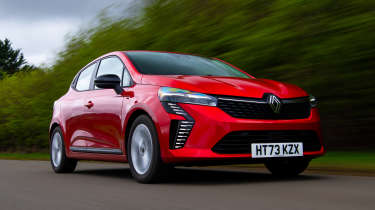
- Prices from £21,895
- Best for driving experience
| Pros |
|
| Cons |
|
On the outside, the Renault Clio is very much an evolution of its predecessor, especially following its latest facelift. Big changes under the skin have brought it right to the sharp end of the supermini market. The Renault Clio E-Tech features a full-hybrid powertrain that combines a 1.6-litre petrol engine with an electric motor to generate 143bhp.
The E-Tech achieves over 60mpg and sprints from 0-62mph in under 10 seconds, plus the rest of the package is a marked improvement over the old car. The Clio is relatively engaging along twisting roads, and the well judged suspension offers a decent blend of precision and comfort. Cabin quality is particularly strong and the five door-only bodystyle provides enough rear legroom for adults, and a 301-litre boot in hybrid form.
“The full-hybrid Clio E-Tech offers impressive fuel economy and zippy EV-like performance around town.” – Ellis Hyde, news reporter, drove the Renault Clio in the UK.
Renault Clio reviewRenault Clio deals
5. Hyundai Kona Hybrid
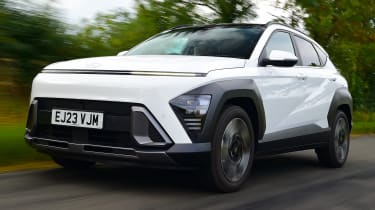
- Prices from £30,890
| Pros |
|
| Cons |
|
The Hyundai Kona Hybrid’s rivals are starting to catch up but our 2023 Car of the Year is still a top buy.
Not only does this small SUV offer an impressive level of practicality for its size, but its low running costs and distinctive appearance also help to make it an appealing hybrid car.
It certainly won’t set pulses racing with its 127bhp power output or 12-second 0-62mph time, but the Kona Hybrid more than makes up for its lack of driving excitement with some impressive efficiency figures. When we tested the Kona Hybrid against the Honda HR-V, we achieved an average of 58.4mpg.
“After the initial pep of the electric motor, the petrol engine seems to provide more noise than it does propulsion, but there’s still enough oomph available for overtaking at motorway speeds.” – Ellis Hyde, news reporter, who drove the Kona Hybrid in the UK.
Hyundai Kona reviewHyundai Kona deals
6. Dacia Jogger Hybrid
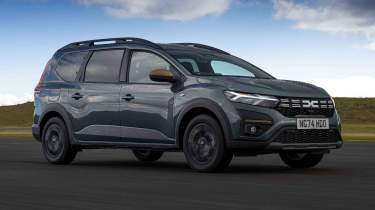
- Prices from £23,305
- Best for big families
| Pros |
|
| Cons |
|
The Dacia Jogger offers incredible value for money. If you want a seven-seat car, it’s much cheaper than almost any other brand-new alternative. You will miss out on some of the luxuries in pricier rivals, but it’s not short on tech under the bonnet.
A 1.6-litre petrol engine works alongside electric motors and a clever multimode gearbox to deliver reasonable performance and return up to 58.9mpg on the WLTP combined cycle. According to Dacia, the Jogger Hybrid can run in pure-electric mode for up to 80 per cent of the time when you’re driving in town. There’s only one downside here; the base pure-petrol Jogger is thousands of pounds cheaper, so unless you do huge miles (or you really need an automatic car), you’re unlikely to recoup that cost with lower fuel bills. But as hybrids go, it’s still a star.
“There’s more to the Dacia Jogger than just passenger carrying, because it’s a practical estate car that offers versatility and low running costs, and it just so happens to have a third row in the boot.” – Dean Gibson, senior test editor, who road tested the Dacia Jogger in the UK.
Dacia Jogger reviewDacia Jogger deals
7. Hyundai Tucson Hybrid
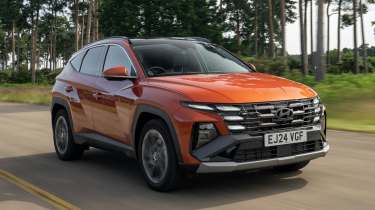
- Prices from £36,220
| Pros |
|
| Cons |
|
The Hyundai Tucson’s bold styling won’t be to everyone’s taste, but there’s no denying the great qualities this car has as a family SUV. In fact, the Hyundai Tucson is such a good car that it won Mid-size SUV of the Year for four years in a row at our New Car Awards.
The Tucson Hybrid utilises a 1.6-litre electrically assisted powertrain with 212bhp, and its efficiency figures are respectable for what is a roomy, tech-packed machine.
When it comes to efficiency, the Hyundai Tucson can’t quite match its rivals, but you should see around the 50mpg mark.
The Tucson drives with finesse without veering towards sportiness, and its relaxed gait makes it a pleasant companion for long trips. Inside, you’ll find a well built, attractive cabin that is very, very well put together and offers a generous level of standard kit. Alongside the smart materials and tech is enough passenger space for four taller adult occupants, as well as 577 litres of boot space.
“Its striking looks, intuitive on-board tech and premium-feeling cabin help it stand out in the overcrowded mid-size SUV class, but the Tucson is a car that appeals to the head as well as to the heart.” – Ellis Hyde, news reporter, who drove the Tucson Hybrid in the UK.
Hyundai Tucson reviewHyundai Tucson deals
8. Toyota Corolla

- Prices from £30,795
| Pros |
|
| Cons |
|
Much like the Yaris that also appears on this list, the Toyota Corolla is another model that’s now powered by the brand's tried-and-tested ‘self-charging’ petrol-electric hybrid technology.
The British-built hatchback is offered in 1.8 and 2.0-litre guises, both of which automatically shuffle between their two power sources and use the car’s petrol engine to charge the battery. An electronic continuously variable transmission (e-CVT) takes the place of a traditional automatic gearbox, and this helps to make the most of the drivetrain’s power. Those craving a little more punch will be best catered for by the 2.0-litre model. With 177bhp on tap, 0-62mph takes just 7.9 seconds. Fuel economy and emissions do take a slight hit as a result of the increased power, as does boot space, but this model still offers a great balance of performance and low running costs.
“Thanks to great refinement, a comfortable ride, fantastic build quality and handling that’s precise and controlled – if not the last word in driving pleasure – there’s very little to dislike about the Corolla.” – Ellis Hyde, news reporter, who drove the Corolla in the UK.
Toyota Corolla reviewToyota Corolla deals
9. MG ZS Hybrid+

- Prices from £22,495
| Pros |
|
| Cons |
|
Like the MG3 Hybrid mentioned earlier, the MG ZS Hybrid+ punches above its weight in terms of bang for your buck.
The 193bhp hybrid drivetrain, based around a 1.5-litre petrol engine and an electric motor, scoots the ZS from 0-62mph in 8.7 seconds, undercutting more expensive yet more cramped rivals like the Jeep Avenger. With the electric motor doing much of the work, the ZS Hybrid+ drives more like an electric car, with very punchy low-down performance, which is great for use around town.
The ZS is accomplished in other areas too, such as generous kit and pretty decent ride and handling, while it’s spacious and has a decently-sized 443 litre boot, too. That it then manages to do all that for under £23k is pretty remarkable, since even hybrid versions of the otherwise very affordable Dacia Duster start at nearly £25,000. It’s just a shame it looks a bit dull inside and out, and MG doesn’t have a great reliability record for its current models.
“Hybrid power suits this car well and sets it apart from its competitors, in what is fast becoming a vastly overcrowded market.” – Alex Ingram, chief reviewer, who road tested the MG ZS in the UK.
MG SZ Hybrid+ reviewMG HS deals
10. Vauxhall Mokka Hybrid
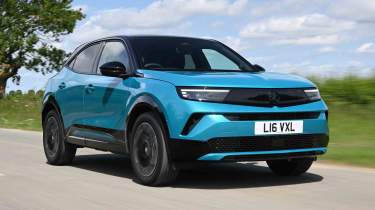
- Prices from £27,870
| Pros |
|
| Cons |
|
A large part of the reason why the Vauxhall Mokka is one of our favourite small SUVs is down to its smooth hybrid petrol/electric powertrain, which is a clear step above the regular petrol engine.
Under the bonnet sits the same 1.2-litre petrol motor you’ll find in the non-hybrid car, but it works alongside an electric motor. This helps smooth out the power delivery, and a combined power output of 143bhp means the Mokka is no slouch when on the move. Vauxhall claims the Mokka hybrid can return 58.8mpg on the official WLTP combined cycle and during our testing we managed to get 47.2mpg when driving on a mixture of roads.
Inside, the latest Mokka combines a simplified look, and a recent update saw the inclusion of a pair of 10-inch screens, while the gloss-black trim has been replaced by a more scratch-resistant brushed silver-effect trim, which should help it stand up to family life.
When it comes to practicality, the Mokka doesn’t compromise on space up front, as it’s quite roomy for what is a narrow car. Passengers in the rear might feel a tad squeezed as the back seat isn’t very wide, the rear windows are also quite small which makes it feel a little closed in. The 350-litre boot is big enough for the weekly shop and offers over 45 litres more boot space than you get in the Mokka’s Corsa sibling.
On the move, overall visibility is pretty good, which makes the car easy to manoeuvre in tight spaces. The Mokka is smooth to drive around town, and when you venture out onto faster roads, the experience is calm and competent. You’ll have a bit more fun in a Ford Puma and get better economy in the Hyundai Kona Hybrid, but the Vauxhall Mokka is a great all-rounder.
"The Mokka Hybrid model is a great stop gap between the petrol and fully electric versions for buyers who are yet to be convinced that electrification is for them. It delivers the same smooth responses as the electric model, eliminating the patchy power delivery of the petrol, especially in auto guise" – Dean Gibson, senior test editor who drove the Vauxhall Mokka Hybrid in the UK.
Vauxhall Mokka reviewVauxhall Mokka deals
How we test hybrid cars
Our expert road testers have tested every hybrid car on the market in the UK over hundreds of miles, and because the focus of these cars is very much on cutting costs we pay particular attention to the real-world fuel economy we can achieve.
You’ll find the results of our efficiency testing in our in-depth reviews and you can rest assured that the best hybrids we select do a better job of matching their official fuel efficiency figures in the real world than some of the alternatives.
We also look for a smooth and natural-feeling hybrid system that intelligently shifts between power sources without much impact on the driver. A good hybrid should offer excellent refinement and low noise levels but also strong electrically-assisted performance. Otherwise, it’s largely the factors we look for in any car; build quality, space, practical design and user-friendly technology.
How to choose the best hybrid car for you
Hybrid cars come in a wide range of different shapes and sizes, although the full hybrid technology that we’re concentrating on here does tend to be more common in small to mid-size models.
Plug-in hybrid systems, that can travel much further on purely electric power, are more regularly found in larger, more expensive cars these days but there are exceptions. Here are the key issues to consider when considering a hybrid car.
1. Running costs
The big appeal of a hybrid car tends to be cutting costs. Buyers will look to hybrids for the improved fuel economy that electrical engine can deliver.
Because most hybrid powertrains are offered as part of a range of engine options, that also includes non-hybrid petrol and diesel engines, it’s important to consider if the fuel economy savings of a hybrid car will outweigh the extra cost of buying it in the first place.
Hybrid tech will cost more so you need to do enough mileage over the course of your ownership period to make that extra outlay worthwhile compared to a cheaper non-hybrid option.
2. Driving experience
Hybrids can run purely on electric power at low speeds and some can drive for a few miles without engaging the petrol engine at all. This helps cut noise levels in the cabin and around town for a more relaxed driving experience. It’s also good for local air pollution.
When test driving a hybrid, you’ll want to look for a car that drives smoothly at low speeds, especially in that transition from electric to petrol power, and back again.
Some models will rev the engine unnecessarily or be slow to respond to your inputs on the throttle in certain situations, but the best hybrid systems feel easy and natural to drive with the difference between the two power sources virtually unnoticeable.
3. Practicality
There is very little difference between a hybrid car and a purely petrol or diesel car when it comes to practicality. Whereas plug-in hybrid models often sacrifice a little boot space to accommodate the larger battery, full hybrids have smaller battery units and any compromises are minimal.
As always, look for a car with the space to perform the tasks you need it to. Sit in all the seats and check out the legroom in the seat behind your own driving position. If you need to fit a child seat in the back, put golf clubs or pushchairs in the boot, make sure you take these items with you when you go to look at or test drive the car.
Hybrid or electric?
With costs being such a big driver for customers who choose a hybrid car, the thought of buying a full EV has probably also crossed their minds. We often think of plug-in hybrid technology as a stepping stone to a pure electric car but with full hybrids, which don’t need charging at all, the ownership experience is very much like that of a normal petrol or diesel car.
If you’re worried about the logistics of charging an EV, a hybrid has none of those concerns attached, but it will give you a little flavour of electric running around town.
Most buyers with the facility to have a charging point installed at home could save even more on running costs by choosing an electric car over a hybrid but those forced to rely on more expensive public charging may find that the costs and practicalities of an EV don’t add up. You can find out more about the differences between hybrid and electric cars with our guide.
Looking to buy a new hybrid? Search our dealer network and you'll find 1,000s of great value new cars in stock and available now right across the UK. Find your new car...

